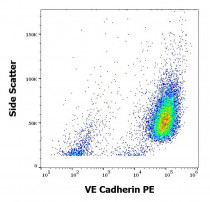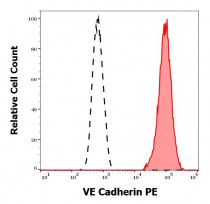ARG42344
anti-VE Cadherin antibody [55-7H1] (PE)
anti-VE Cadherin antibody [55-7H1] (PE) for Flow cytometry and Human
Overview
| Product Description | PE-conjugated Mouse Monoclonal antibody [55-7H1] recognizes VE Cadherin |
|---|---|
| Tested Reactivity | Hu |
| Tested Application | FACS |
| Specificity | The mouse monoclonal antibody 55-7H1 recognizes a calcium-independent extracellular epitope on CD144 (VE-cadherin, cadherin 5), an adhesion molecule expressed on endothelial cells. |
| Host | Mouse |
| Clonality | Monoclonal |
| Clone | 55-7H1 |
| Isotype | IgG1, kappa |
| Target Name | VE Cadherin |
| Antigen Species | Human |
| Immunogen | Human endothelial cells. |
| Conjugation | PE |
| Alternate Names | 7B4 antigen; 7B4; Cadherin-5; VE-cadherin; CD144; CD antigen CD144; Vascular endothelial cadherin |
Application Instructions
| Application Suggestion |
|
||||
|---|---|---|---|---|---|
| Application Note | * The dilutions indicate recommended starting dilutions and the optimal dilutions or concentrations should be determined by the scientist. |
Properties
| Form | Liquid |
|---|---|
| Purification | Purified |
| Buffer | PBS and 15 mM Sodium azide. |
| Preservative | 15 mM Sodium azide |
| Storage Instruction | Aliquot and store in the dark at 2-8°C. Keep protected from prolonged exposure to light. Avoid repeated freeze/thaw cycles. Suggest spin the vial prior to opening. The antibody solution should be gently mixed before use. |
| Note | For laboratory research only, not for drug, diagnostic or other use. |
Bioinformation
| Database Links | |
|---|---|
| Gene Symbol | CDH5 |
| Gene Full Name | cadherin 5, type 2 (vascular endothelium) |
| Background | This gene encodes a classical cadherin of the cadherin superfamily. The encoded preproprotein is proteolytically processed to generate the mature glycoprotein. This calcium-dependent cell-cell adhesion molecule is comprised of five extracellular cadherin repeats, a transmembrane region and a highly conserved cytoplasmic tail. Functioning as a classical cadherin by imparting to cells the ability to adhere in a homophilic manner, this protein plays a role in endothelial adherens junction assembly and maintenance. This gene is located in a gene cluster in a region on the long arm of chromosome 16 that is involved in loss of heterozygosity events in breast and prostate cancer. [provided by RefSeq, Nov 2015] |
| Function | Cadherins are calcium-dependent cell adhesion proteins (By similarity). They preferentially interact with themselves in a homophilic manner in connecting cells; cadherins may thus contribute to the sorting of heterogeneous cell types (PubMed:21269602). This cadherin may play a important role in endothelial cell biology through control of the cohesion and organization of the intercellular junctions (By similarity). It associates with alpha-catenin forming a link to the cytoskeleton (PubMed:10861224). Acts in concert with KRIT1 and MPP5 to establish and maintain correct endothelial cell polarity and vascular lumen (By similarity). These effects are mediated by recruitment and activation of the Par polarity complex and RAP1B (PubMed:20332120). Required for activation of PRKCZ and for the localization of phosphorylated PRKCZ, PARD3, TIAM1 and RAP1B to the cell junction (PubMed:20332120). [UniProt] |
| Cellular Localization | Cell junction. Cell membrane; Single-pass type I membrane protein. Note=Found at cell-cell boundaries and probably at cell-matrix boundaries. KRIT1 and CDH5 reciprocally regulate their localization to endothelial cell-cell junctions. [UniProt] |
| Calculated MW | 88 kDa |
| PTM | Phosphorylated on tyrosine residues by KDR/VEGFR-2. Dephosphorylated by PTPRB (By similarity). O-glycosylated. [UniProt] |
Images (2) Click the Picture to Zoom In
-
ARG42344 anti-VE Cadherin antibody [55-7H1] (PE) FACS image
Flow Cytometry: HUVEC cells stained with ARG42344 anti-VE Cadherin antibody [55-7H1] (PE) at 10 µl / 10^6 cells in 100 µl of cell suspension.
-
ARG42344 anti-VE Cadherin antibody [55-7H1] (PE) FACS image
Flow Cytometry: Separation of HUVEC cells (red-filled) from HL-60 cells (black-dashed). Cells were stained with ARG42344 anti-VE Cadherin antibody [55-7H1] (PE) at 10 µl / 10^6 cells in 100 µl of cell suspension.







